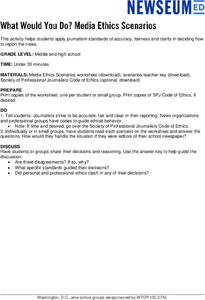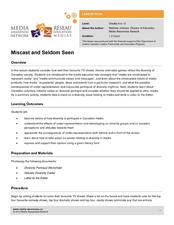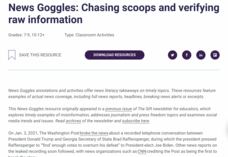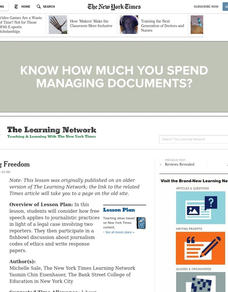Curated OER
Diversity in Media: Looking Critically at What We See
This learning experience fosters awareness of representations we see, and don't see, in the media. Learners list TV programs, games, and films they enjoy, identify characters' ethnic, religious, (dis)ability, and sexual orientation...
Newseum
What Would You Do? Media Ethics Scenarios
Young journalists are presented with scenarios that involve media ethics. They must decide in each case whether to cover the story, what they would cover, and if covered, what the angle would be.
Media Smarts
Taking Charge of TV Violence
Encourage your class to become aware of the violence that is present in children's television programs and how this violence can influence children. Do this by holding the planned class discussion in this lesson plan and providing...
Curated OER
Miscast and Seldom Seen
Consider how well students' favorite TV shows, movies and video games reflect the diversity of society. The instructional activity introduces your class to several media literacy concepts, such as how media conveys values and messages,...
Reporters Without Borders
2017 World Press Freedom Index
Freedom of the press was seen as a right so important that the Founding Fathers listed it as part of the first amendment to the United States Constitution. Americans pride themselves on this freedom, but just how free are American...
Media Smarts
Broadcasting Codes
Let your learners be the judges for a series of case studies that focus on broadcast codes in Canada. In order to familiarize your class with the codes and guidelines that govern the broadcasting industry, in particular Canada's...
News Literacy Project
News Goggles: Chasing Scoops and Verifying Raw Information
A 23-slide presentation teaches young media analysts how to identify a scoop or exclusive first report of a breaking story, how these reports become verified, and how subsequent reports in other news sources add information or refocus...
Media Education Lab
The Ethics of Propaganda
What are the short and long-term consequences for consumers and producers of modern media propaganda? Class members ponder this essential question as their unit study of ethics of propaganda concludes. After examining two case studies,...
Curated OER
Making Media for Democratic Citizenship
Students examine global development issues. In this media awareness lesson, students analyze current event issues and create video podcasts based on their research.
Smithsonian Institution
POWs
Why did Vietnam POWs and their families receive more media attention than POWs in previous wars? To answer this question, class members view artifacts, read articles, and engage in class discussion. Individuals then assume the voice of...
Newseum
Civil War: Encoding the News
Young journalists learn to appreciate the advantages of how modern media technology enables rapid news delivery as they compare today's media revolution to how the telegraph and Morse Code revolutionized news coverage during the Civil...
Anti-Defamation League
Student Dress Codes: What's Fair?
The controversy over school dress codes continues. The debate involves questions like, why is there a policy? Who sets the policy? Who enforces the policy? What is a fair policy? Tweens and teens have an opportunity to engage in the...
News Literacy Project
News Goggles: Identifying the News Source
A 25-slide presentation teaches viewers how to identify the source of stories in newspapers and online news sites. The slides show how to locate the byline where either the reporter's name or the wire service that provided the story can...
College Board
2009 AP® Computer Science A Free-Response Questions
Coding and decoding is part of the work. Pupils and teachers use the released questions from 2009 to gather information on how topics show up on the AP Computer Science exam. The four questions range from the array data structure to...
Curated OER
Shaping the News
High schoolers explore television journalism. In this journalism lesson, students discuss the attributes of television broadcasting. High schoolers then review their journalism code of ethics and then conduct research for stories that...
Curated OER
Lesson: Paul Chan: Alternumeric Fonts
Learning to analyze language, symbols, and codes is part of becoming a deep and critical thinker. Young analysts consider their ability to see hidden messages as they analyze the work of Paul Chan. There are two fully developed...
Curated OER
Freedoms of the Press
Young scholars examine journalism ethics. In this journalism lesson, students complete a think, pair, share activity about the journalistic code of ethics. Young scholars then discuss an ethics scenario.
Common Sense Media
My Online Code
Approach ethical online behavior with a series of activities geared toward teaching pupils about digital citizenship. After a brief discussion about ethics, small groups inspect a fictional social networking profile with ethics in mind....
Curated OER
The Influence of Media on Decision Making: Exploring Ideas of Bias in Media with a Committee of the Legislative Assembly
Eleventh graders participate in a role play about the Legislative Assembly of British Columbia. They write an essay evaluating the influence (if any) the media has on decision-making.
Curated OER
Press-ing Freedom
Students consider how free speech applies to journalistic practices in light of a legal case involving two reporters. They participate in a fishbowl discussion about journalism codes of ethics and write response papers.
Curated OER
Spelling Connection: Grade 2: Spelling Words In Code
In this spelling worksheet, students use the code key of shapes and consonant blends to decipher and write 10 spelling words. Students then connect the dots in a picture as they follow words in alphabetical order.
Knoxville Art Museum
Lee Walton: Codes in Drawings
Familiar with the systems-based sports drawing of experimental artist Lee Walton? If so, this drawing exercise if for you. Young artists observe an activity over time, develop a coded language for the activity, and then draw a...
Media Smarts
Television Broadcast Ratings
Explore the relationships between programming, advertising, and the ensuing rating wars. Help develop the media smarts of your pupils through this examination of advertisers for popular shows. Although the included Sweep Chart features...
Curated OER
Spelling Words In Code
In this spelling learning exercise, students use the code to write 27 spelling words. Students must double the final T or L before adding the ending on certain words.

























